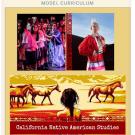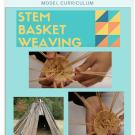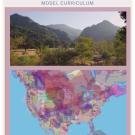Grade 6
Land Acknowledgment Toolkit
Toolkit developed by CA Indian Culture & Sovereignty Center and CSU San Marcos American Indian Studies. The purpose of the toolkit is to encourage all academic staff, students, administrators to acknowledge the original nations on whose land we live, learn, and work.
Acorns - The Importance of Native Diets
Students will learn about how acorns are an important part of the diet of California Indian Tribes. Students will learn about the importance of Native diets to familiarize oneself with the traditional and contemporary way of acorn process.
Resilience Through Northwestern California Basket Weaving
In this lesson, students will explore the rich tradition of basket weaving among California Tribes, gaining an appreciation for it as both a longstanding cultural practice and a living, contemporary art form. By examining the evolution of basketry across different historical periods, students will learn how California Tribes have preserved and adapted their traditions in the face of colonization and systemic oppression. The accompanying assignment will encourage students to critically analyze the impact of broader U.S. policies and historical events on Indigenous cultures—highlighting both the harm caused and the ways Indigenous communities have resisted and adapted.
Reviving Tradition: The Resurgence of Women's 111 Tattoos in Northern California Tribes
This lesson offers students a meaningful and culturally responsive exploration of the resurgence of women’s 111 chin tattoos among the Hupa, Yurok, and Karuk Tribes of Northern California. Once widely practiced before colonization, the 111 tattoo tradition was dormant for several decades. Today, this deeply personal and cultural form of expression is being revived by Native women as a powerful symbol of identity, resistance, and connection to heritage. Through this lesson, students will examine the history and significance of these tattoos, as well as the broader cultural revitalization efforts occurring in Native communities, including the preservation of language, traditional ceremony, and cultural arts. Using a thoughtfully designed slideshow, video interviews, and primary source materials, students will learn directly from modern Native women who have received the 111 tattoo. They will reflect on the personal, emotional, and social meaning behind these choices and discuss how cultural expression and appreciation are essential to Indigenous resilience today. The lesson is structured to be student-centered and engaging. Activities include small-group discussions, reflective writing, visual analysis, and collaborative presentations. Students will work together to answer key questions, analyze first-person narratives, and consider the responsibilities involved in honoring and continuing cultural traditions. Vocabulary such as cultural expression, cultural appreciation, and cultural revitalization is woven throughout to deepen understanding and guide respectful conversations. This lesson is ideal for middle or high school classrooms and aligns well with social and emotional competencies, language arts, and ethnic studies standards. It invites thoughtful dialogue, promotes empathy, and encourages students to think critically about history, identity, and the importance of cultural survival. Most importantly, it centers Indigenous voices and lived experiences making it a powerful and relevant unit for today’s learners.
Project-Based Learning on Land Acknowledgments
Students will design and complete a project that reflects their learning about land, Indigenous presence, and community responsibility. Students will present their work to an audience, demonstrating respectful engagement, informed research, and a commitment to ongoing learning and allyship.
Moving Beyond Land Acknowledgments
Students will critically evaluate the limitations of land acknowledgments when not paired with action or accountability. Students will explore tangible ways to support Indigenous communities and advocate for justice beyond symbolic statements.
Collaborating with Local Tribal Communities
Students will learn and apply respectful communication protocols when engaging with local California tribal communities. Students will incorporate Indigenous voices, perspectives, and feedback into their understanding and representation of local histories and cultures.
Understanding Land Acknowledgments
Students will examine the historical and cultural significance of land acknowledgments and analyze their use in educational and public settings. Students will identify the Indigenous peoples whose ancestral lands they occupy and begin to explore the importance of recognizing those connections.





